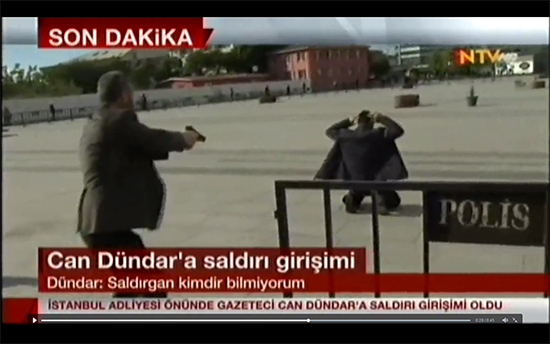Leading Turkish journalists sentenced to five years in prison
The Committee to Protect Journalists condemned a Turkish court’s sentencing today of two journalists for the opposition daily Cumhuriyet.
Istanbul’s 14th Court for Serious Crimes sentenced editor Can Dündar to seven years in prison, reduced to five years and 10 months, on charges of revealing state secrets that could harm the security of the state or its domestic or foreign interests,Cumhuriyet reported. The court sentenced Ankara Bureau Chief Erdem Gül to six years in prison, reduced to five years, on the same charge. Both were acquitted of espionage and terrorism charges that could have resulted in life sentences, according to Cumhuriyet.
Man attempts to shoot Cumhuriyet editor outside courthouse
A man attempted to shoot Cumhuriyet newspaper editor Can Dündar outside Istanbul’s Çağlayan courthouse today, according to press reports. Dündar was unharmed, but NTV reporter Yağız Şenkal was hit and lightly injured by a stray bullet, Şenkal told NTV.
Turkish television stations showed police arresting the suspected shooter, whom press reports later identified as Murat Şahin.
According to Fatih Polat — the editor-in-chief of the daily newspaper Evrensel, who was at the courthouse covering the trial — the shooter approached Dündar as he left the courthouse with his wife on a one-hour break before the court was due to give its verdict. As he approached, the assailant shouted at Dündar that he was a “traitor,” and fired two shots, aiming low.
“We do not know who the attacker is, but we know who made us into a target. That is sufficient for us,” Dündar said after the attack, according to Polat.
Dündar and Cumhuriyet‘s Ankara bureau chief, Erdem Gül, are on trial on charges of disclosing state secrets. The Committee to Protect Journalists was present at the courthouse before today’s hearing but was not allowed inside.
“We’ve come a long way in this case. I think this is the end,” Dündar told reporters in front of Istanbul’s Çağlayan courthouse this morning, before the hearing began. “They’ve tried everything since the beginning.”
“Journalism is on trial here,” he said, according to press reports.
Columnist’s trial on terrorism charges begins
Istanbul’s 14th Court for Serious Crimes began trying Gültekin Avcı, a former prosecutor and columnist for the defunct Bugün newspaper, on charges of “attempting a coup,” “being a leader of a [terrorist] organization,” and “revealing state secrets that could affect state security or the state’s domestic or international interests.” He faces a maximum sentence of life without parole plus an additional 75 years in prison if convicted, according to press reports.
The charges against Avcı, who was detained in the western Turkish city of Izmir in September 2015, stem from a series of columns he wrote for Bugün alleging that Turkey’s intelligence agency had connections to the Islamist group Tawhid-Salam. News reports said Turkey classed the Iranian-backed group as a terrorist organization in 2014. Avcı is accused of being a leader of the Hizmet movement — followers of exiled preacher Fethullah Gülen, whom Turkish authorities accuse of maintaining a terrorist organization and “parallel state structure” within Turkey.
Bugün was owned by the Koza İpek media group, which a court ordered put under trusteeship in October 2015. The new trustees closed the company on March 1, 2016.
At the trial, Avcı argued that a February 2016 Constitutional Court ruling that Cumhuriyet newspaper journalists Can Dündar and Erdem Gül must be released because their arrest violated their constitutional rights should also apply to him.
“Can Dündar remained under arrest for three months for 52 columns and two interviews before he was released,” Avcı said, according to the daily newspaper Özgür Düşünce. “I should be released in any case, as I am on trial because of six columns.”
The columnist said he was being tried for journalism.
“[The indictment] does not say whom I am commanding with my columns. There are no calls for violence in my columns; there is no [terrorist] organization. The prosecutor accuses me of ‘manipulating people’s perceptions,’ but there is no such offense in the law,” Avcı said, according to Özgür Düşünce.
The court did not agree to release him. His trial is scheduled to resume on June 6.
[May 6, 2016]
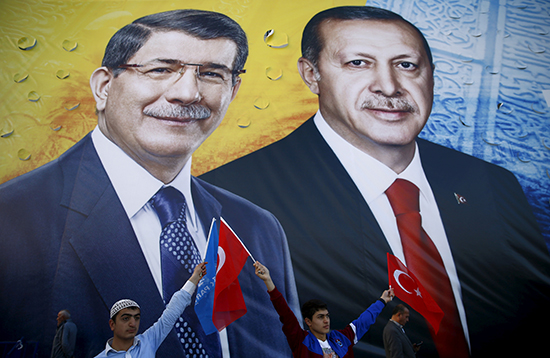
Police detain news agency journalist from his home
Police detained Abdülkadir Turay, a correspondent for the pro-Kurdish DİHA news agency in the southeastern Turkish town of Mardin, from his home in a dawn raid today, the news agency reported. At least four other people were detained in dawn raids in the town the same morning, DİHA said. The reasons for the arrests were not immediately clear.
DİHA also reported that a court yesterday formally arrested Mehmet Hakkı Yılmaz, their reporter who was arrested after being the first reporter to arrive at the scene after a car bomb exploded in front of a police station in the southern Turkish town of Gaziantep, killing two policemen. Today the news agency said police had interrogated him about the Kurdistan Workers’ Party (PKK) and the Islamic State group, and about legal documents found in his possession, which he said he had taken from a lawyer as part of a journalistic investigation. Yılmaz told interrogators that he had been the first at the crime scene because he happened to be in the neighborhood when the bomb exploded, DİHA reported.
Journalist sentenced to six years in prison
A court in the southeastern district of Midyat today sentenced DİHA’s reporter Murat Verim to six years in prison sentence on charges of “committing a crime on behalf of a [terrorist] organization without being a member,” after a single hearing, the news agency reported. The charges were based on an article on local self-government Verim had written for the newsletter of Dargeçit municipality, where he also works as a public relations official. Authorities briefly detained him on January 10, 2016, in connection with that article, but released him after questioning, DİHA reported.
Verim remains free, pending the Supreme Court of Appeals’ consideration of the appeal his lawyers filed on his behalf today, DİHA said.
Authorities censor news agency website
The Turkish telecommunications regulator TİB censored the website of the pro-Kurdish DİHA news agency, the news agency reported today. It was the second time in three days the website was censored, and the 37th time since July 2015, according to DİHA.
One-year suspended sentence for Bugün journalist
An Istanbul court today handed Kamil Muman — formerly a journalist with the daily Bugün newspaper – a suspended sentence of one year and 15 days on charges of resisting arrest and insulting police as they raided the offices that housed the newspaper and other holdings of its parent company, Koza-İpek, in October 2015, according to press reports and the Pak Media İŞ journalists’ union. That raid followed a court order appointing new, pro-government trustees, who five months later closed the company.
Because the sentence was suspended, Muman is not in jail, but is on probation.
In the trial, Muman’s lawyers maintained that the journalist was the victim, that video and photos published widely in the Turkish and international media showed police beating him as they arrested him, but the court refused to consider the video evidence, according to court documents Pak Media İŞ published to the social media website Twitter.
[May 5, 2016]
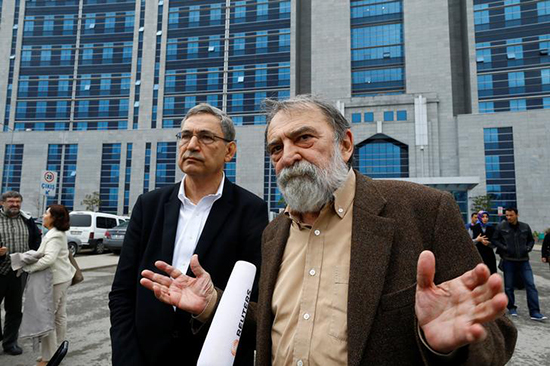
Columnist on trial for insulting Erdogan
Istanbul’s Anadolu 2nd Court of Penal Peace yesterday began hearing the case against Murat Belge, an academic and columnist for the daily newspaper Taraf, on charges he insulted Turkish President Recep Tayyip Erdoğan in a September 12, 2015, column suggesting the president had rekindled a conflict with Kurdish rebels for electoral benefit, according to press reports. Belge denied the charges in court.
Speaking after the hearing Tuesday, Belge, who faces up to four years in prison if convicted, joked, “I am a member of one of Turkey’s most populous clubs: the club of people who have insulted Erdoğan,” according to press reports.
Erdoğan’s lawyers have filed almost 2,000 criminal cases on charges of insulting the president since he became president in 2014.
Among those present to show solidarity with Belge at Tuesday’s hearing was Nobel-Prize-winning author Orhan Pamuk.
“This has nothing to do with insulting the president,” Pamuk told Reuters. “This is only about silencing political opposition. This is about intimidating people and scaring the country so nobody would criticize the government.”
Belge’s trial is scheduled to resume on September 20, 2016.
[May 4, 2016]
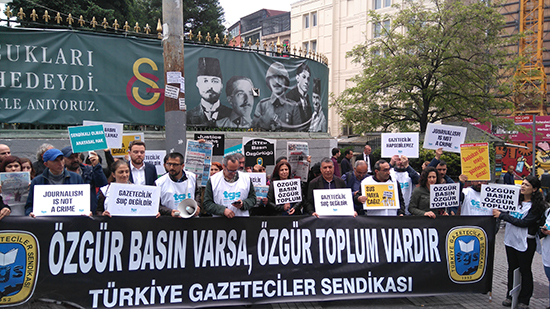
Prosecutor seeks reduced charges for Cumhuriyet journalists
Evliya Çalışkan, the prosecutor assigned to the case of Cumhuriyet Editor-in-Chief Can Dündar and Ankara Bureau Chief Erdem Gül two days before their trial began on March 25, today asked the court to reduce the charges against the journalists, according to press reports.
If the court agrees, the two will no longer face charges of “willingly and knowingly aiding a terrorist organization without being a member,” “attempting a coup,” or espionage in connection with a May 2015 report alleging that Turkey’s intelligence agency had attempted to arm Syrian rebel groups, the news website Bianet reported. If convicted of those charges, the journalists could face multiple life sentences.
Instead, Çalışkan today asked the court to sentence Dündar only to 25 years in prison, and to sentence Gül only to 10 years in prison on charges of revealing state secrets that could affect state security or the state’s domestic or international interests, according to news reports.
The court has yet to respond to the prosecutor’s request.
Çalışkan also argued today that the charges were not press crimes, and that Turkey’s press laws therefore did not apply, Bianet reported. Defense lawyers had argued that the charges should be thrown out because Turkey’s press laws require that criminal complaints regarding articles be brought within four months of their publication.
Journalists protest media crackdown
The Turkish Journalists’ Union (TGS) demonstrated in central Istanbul’s Galatasaray Square to protest the government’s crackdown on press freedom today, World Press Freedom Day.
“There is no press freedom. This is not a day for celebration. It is a day for journalists to resist and not to bow down to pressure,” Uğur Güç, head of the TGS, told the Committee to Protect Journalists at the protest. Güç added that Turkish journalists were being threatened, insulted, beaten, and arrested for doing their jobs, but that they would do not give up revealing the truth.
Hakkı Boltan, co-chair of the Free Journalists’ Association told CPJ that the state of press freedom in western Turkey differed from that in the predominantly Kurdish regions of eastern Turkey. In those regions, he said, “We have been fighting against attacks and oppression since the 1990s. If we can unite in solidarity around this experience, then we stand a chance of being able to advance press freedom” across the country, he told CPJ.
Three reporters detained, news agency website censored
Turkish security officers detained Erdoğan Alayumat and Ergin Çağlar, reporters for the pro-Kurdish Dicle News Agency (DİHA), while they were reporting from Hatay province, near the Syrian border, DİHA reported today. The journalists were released two hours later, DİHA said.
Separately, DİHA reported that Murat Verim, the news agency’s correspondent in Mardin province, faces charges of membership in a terrorist organization. DİHA said that the charges stem from an article on local self-government Verim had written for the newsletter of Dargeçit municipality, where he also works as a public relations official. Authorities briefly detained him on January 10, 2016, in connection with that article, but released him after questioning, DİHA reported.
Authorities regularly target the news agency by detaining its reporters and blocking its website. Today, DİHA reported that Turkish telecommunications regulator TİB ordered the news agency’s website blocked for the 36th time since July 2015. DİHA continues to publish via an alternative web address.
[May 3, 2016]
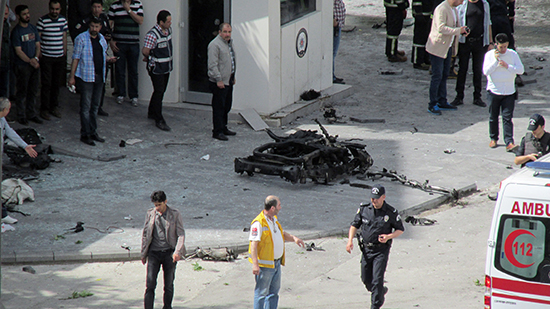
News editor detained for tweets
Masked policemen detained Hamza Aktan, news editor for the pro-Kurdish television station IMC TV, in an early Saturday morning raid of his home in Istanbul, according to press reports, a statement on his employer’s website, and Turkish press freedom groups.
The station said police questioned Aktan about his activity on the social media website Twitter, and in particular his retweeting of a call from the BBC asking readers to send photos or information from the southeastern, predominantly Kurkish town of Cizre when it was under military curfew.
Prosecutors on Saturday night asked a judge to detain him pending trial on charges of “spreading propaganda for a [terrorist] organization,” but the judge declined, and instead released him under “judicial control,” meaning he must regularly appear at a police station, the BBC’s Turkish service reported.
“Judicial control, like detention, is a form of punishment,” IMC quoted Aktan as saying after his release. “This is right neither as a journalist, nor as a citizen. This is a challenge to freedom of expression,” he said.
Police detain first journalist at site of bombing
Police in the southern Turkish town of Gaziantep on Sunday detained Mehmet Hakkı Yılmaz, a reporter for the pro-Kurdish DİHA news agency, his employer reported. The journalist was the first reporter on the scene after a car bomb exploded in front of a police station, killing two policemen and injuring at least 20 people. Police detained Yılmaz after he filed an urgent story on the attack, DİHA said.
Ban on reporting bomb attacks
The Dicle Court of Criminal Peace has imposed a ban on broadcasting any news or discussion of a car-bomb attack on a security garrison in the southeastern Turkish town, the news website Bianet reported today, citing a notice from the national broadcast regulator, RTÜK.
A court in Gaziantep on Sunday imposed a ban on all news coverage of that day’s car-bomb attack on a police station there, the website of the daily Sabah newspaper reported. Such bans have become routine after bomb attacks in Turkey.
[May 2, 2016]
